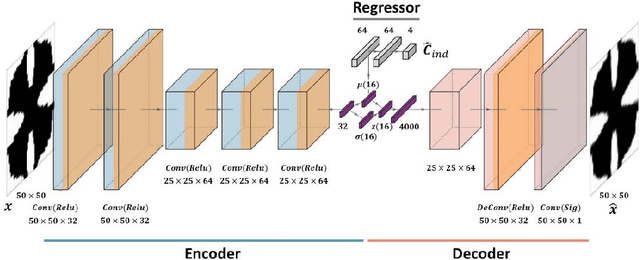Deep Generative Modeling for Mechanistic-based Learning and Design of Metamaterial Systems
Paper and Code
Jun 27, 2020



The inverse design of metamaterials is difficult due to a high-dimensional topological design space and presence of multiple local optima. Computational cost is even more demanding for design of multiscale metamaterial systems with aperiodic microstructures and spatially-varying or functionally gradient properties. Despite the growing interest in applying data-driven methods to address this hurdle, current methods either only focus on microstructure generation or adopt an unscalable framework for the multiscale design. In this study, we propose a novel data-driven metamaterial design framework based on deep generative modeling. A deep neural network model consisting of a variational autoencoder (VAE) and a regressor for property prediction is trained on a large metamaterial database to map complex microstructures into a low-dimensional, continuous and organized latent space. Our study shows several advantages of the VAE based generative model. First, the latent space of VAE provides a distance metric to measure shape similarity, enabling interpolation between microstructures and encoding meaningful patterns of variation in geometries and properties. For microstructure design, the tuning of mechanical properties and complex manipulations of microstructures are easily achieved by simple vector operations in the latent space. Second, the vector operation can be further extended to form metamaterial families with controlled gradation of mechanical properties. Third, for multiscale metamaterial systems design, a diverse set of microstructures can be rapidly generated based on target properties at different locations and then assembled by an efficient graph-based optimization method to ensure compatibility between adjacent microstructures. We demonstrate our framework by designing both functionally graded and heterogeneous metamaterial systems that achieve desired distortion behaviors.
 Add to Chrome
Add to Chrome Add to Firefox
Add to Firefox Add to Edge
Add to Edge